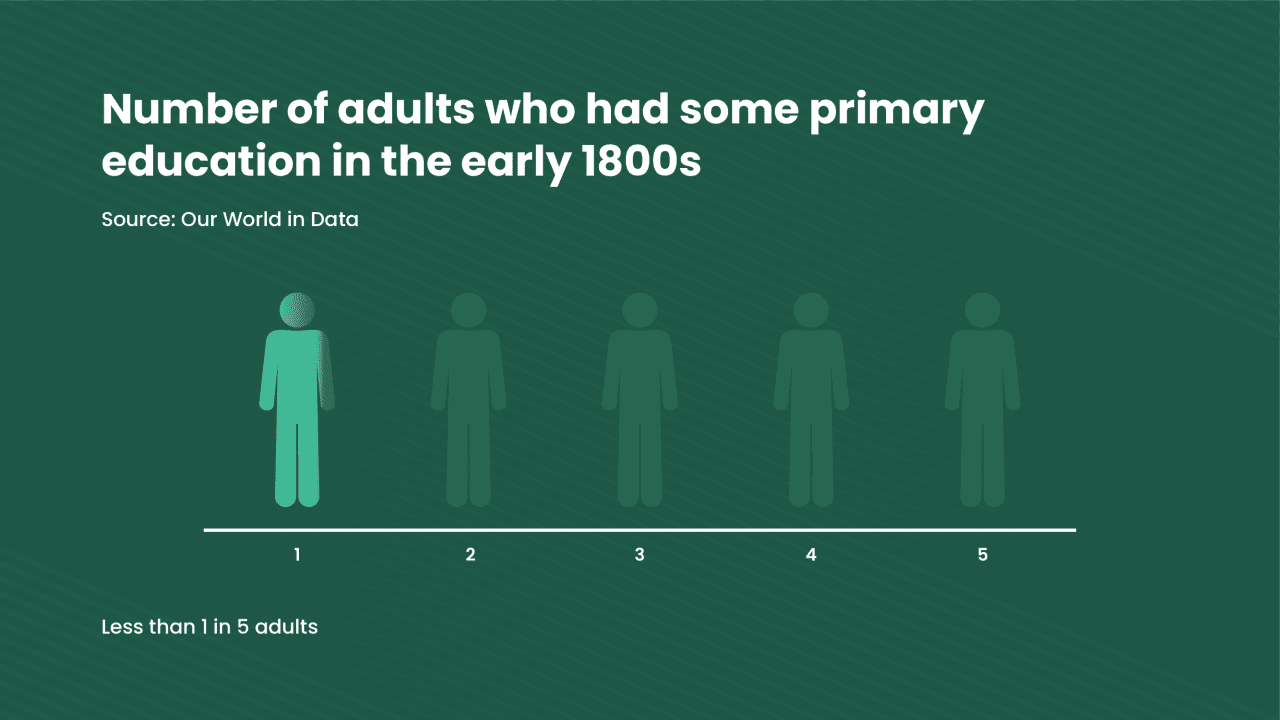Access to education was often limited to a selected few, more often to the wealthy and privileged in society. According to a report by “Our World in Data,” fewer than 1 in 5 adults had some primary education in the early 1800s; education was only available to a small elite and was seen as a Luxury.
The rise of industrialisation led to the introduction of mandatory education systems in many Western countries. Even though access to education was still unequal, significant strides were made towards democratising education. In 2015, the United Nations ranked ‘ensuring inclusive and equitable quality education and fostering lifelong learning opportunities for all’ as the fourth most pressing global issue.
The increasing rate of globalisation and the growth of digital technology have also revolutionised how education is delivered and accessed. Forward-thinking organisations have seized these opportunities to make knowledge accessible to all their employees, irrespective of location.
What is the democratisation of Learning?
The democratisation of Learning means ensuring that people across organisations have equal access to education and information. It involves making knowledge more accessible, affordable, inclusive, flexible, and equitable to everyone. Empowering all employees within the organisation to share knowledge and giving them the freedom to learn at their own pace, learn from peers and continually improve.
What are the key Features of Democratised Learning?
Equal Access to Learning Opportunity: This is at the heart of the democratisation of learning. It ensures that people across the organisation, irrespective of their gender, background and location, have equal access to relevant learning resources that would enable them to deliver on their work.
Diversity and Inclusion: One primary attribute of learning democratisation is that it embraces diversity and inclusion. It fosters an inclusive learning environment, recognising people’s diverse needs and learning styles. This inclusive environment will help promote a culture of mutual respect and understanding.
Lifelong Learning: Another exciting feature is the recognition that learning is a lifelong process beyond traditional formal education settings. Democratising Learning encourages continuous learning opportunities for all segments of society. Individuals can continually learn new skills to adapt to changing industries and technology.
Taking Ownership of Learning. Democratising learning enables individuals to access the information they need at the point of need. Employees are empowered to navigate the complex business environment effectively when they have access to learning resources that enable them to develop the skills and competencies needed to work effectively.
What are the benefits of instituting a democratic learning system?
Having information scattered within an organisation is one major problem that costs organisations money, time, and resources. According to research by Starmind Future of Work, 61% of employees do not find the information they need to do their jobs effectively. Information is usually stored on Google Drive, inboxes, and people’s heads, so democratising learning is crucial. By giving employees instant access to information, tools, and resources, they can collaborate, share knowledge, and generate creative ideas, which helps boost productivity and drive growth. Democratising knowledge also brings the following benefits to organisations.
Drives Productivity and Retention: Organisations that provide equal access to learning opportunities for workers promote a culture of continual growth and development. This makes employees feel their organisations prioritise their learning requirements and professional growth. This leads to higher engagement and work satisfaction, increasing productivity and retention.
Improves Talent Development and Engagement: Democratising learning allows businesses to invest in the growth of their workforce by providing employees with the requisite skills and information they need to flourish in their professions and improve their careers. This investment in talent development helps to increase employee loyalty and decreases turnover since employees are more inclined to stay with companies that value their professional growth and success.
Promotes Agility and Competitiveness: Organisations that democratise Learning can respond quickly to changing market conditions and grasp new possibilities. By providing staff with the skills and information required to adapt to new technology, trends, and client preferences, organisations may retain a competitive advantage and promote development in constantly changing sectors.
It Drives Innovation: Investing in the democratisation of learning and development in organisations helps promote a culture of innovation and creativity. Employees with access to different learning resources tend to explore new ways of doing things, try new techniques, embrace change, and collaborate more, leading to enhanced agility and resilience in the face of company challenges and market dynamics.
Enhances the Chances of Becoming a Learning Organisation: Democratising learning can foster the growth of a learning organisation by promoting an open and collaborative culture dedicated to ongoing progress; individuals are encouraged to take charge of their learning path, and knowledge is openly shared. Feedback is valued and incorporated into the learning process, increasing creativity, agility, and overall organisational success.
How Digital Learning Platforms are helping in the democratisation of Learning
A report by Oxford College reveals that Digital Learning is the fastest-growing market in the education industry, having grown by over 900% since its inception in the early 2000s. Eighty per cent of businesses now offer digital learning training, allowing learning to be on demand.
The first step in implementing a successful democratised learning framework is to have the right technology to support your learning efforts. Digital Learning Platforms such as Skillsoft Percipio have helped organisations make learning accessible to all learners, regardless of their geographical location or socio-economic level.
Learners can access courses and learning materials from anywhere, at any time, and at their own pace and convenience, allowing them to fit learning into their workflow. This adaptability allows for a broad range of learning techniques and preferences, allowing learners to quickly adjust their learning experience to their requirements, reducing barriers such as distance and transportation. A report by Forbes shows that 57% of employees now want access to training at their convenience, anywhere, anytime, on-demand.
Digital learning systems use adaptive technology and personalised algorithms to adjust material and activities to individual learners’ needs and preferences. These systems can improve learning outcomes and engagement by assessing learners’ progress, preferences, and performance data.
Digital learning platforms also allow learners to access content in a multimodal mode across multiple subjects and disciplines. Courses are delivered in various sensory modalities, allowing learners to Watch, Read, or listen to content. Courses, e-books, videos, and interactive multimedia resources are available to learners on themes ranging from academic subjects to professional skill development to industry-specific content, appealing to various interests and learning objectives.
These platforms make learning more inexpensive and accessible for those with limited financial resources. Open educational resources (OER) and subscription-based platforms with reasonable price models give learners access to high-quality educational content at a fraction of the expense of traditional education.
Finally, digital learning platforms constantly supply new courses and upgrade existing contents and resources, allowing Learners to acquire new skills, update current knowledge, and keep up to date with the latest information needed for career advancement and success in a rapidly changing business environment.
This article has demonstrated that access to education has developed, and many organisations have used this revolution to democratise learning inside their organisations. The democratisation of learning boosts employee engagement while promoting talent development, creativity, agility, diversity, and inclusivity—all of which contribute to organisational effectiveness.
Digital learning platforms have proven to be a successful approach to democratising learning in many organisations, thus making learning more accessible to everyone. Learners can now access learning materials anywhere, at any time, even when offline and at their own pace. This flexibility has allowed those with other responsibilities, such as work or family, to learn and grow their skills and competencies without risking their other duties.
Phillips Consulting Limited (pcl.) is a trusted Management Consulting firm with over thirty years of experience. We partner with organisations to implement on-demand learning solutions across various sectors and industries. We have partnered with and supported African organisations to democratise learning with Digital Learning Solutions. These solutions are tailored to each organisation’s unique needs and requirements.
Please speak to one of our consultants via digitallearning@phillipsconsulting.net and let us help you democratise learning in your organisation.
Written by:

Victoria Debrah
Business Consultant


